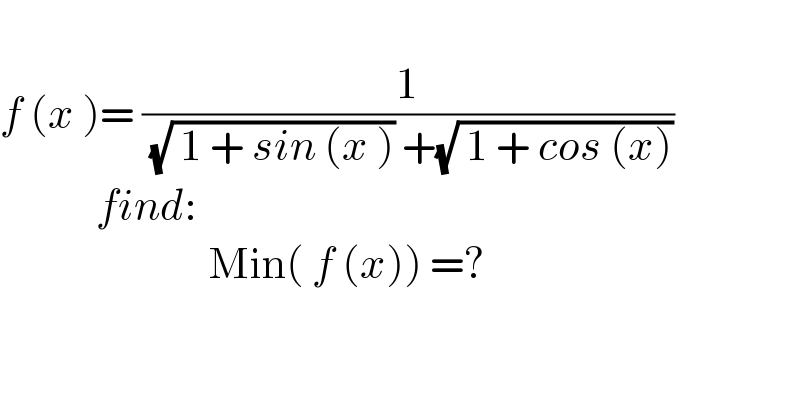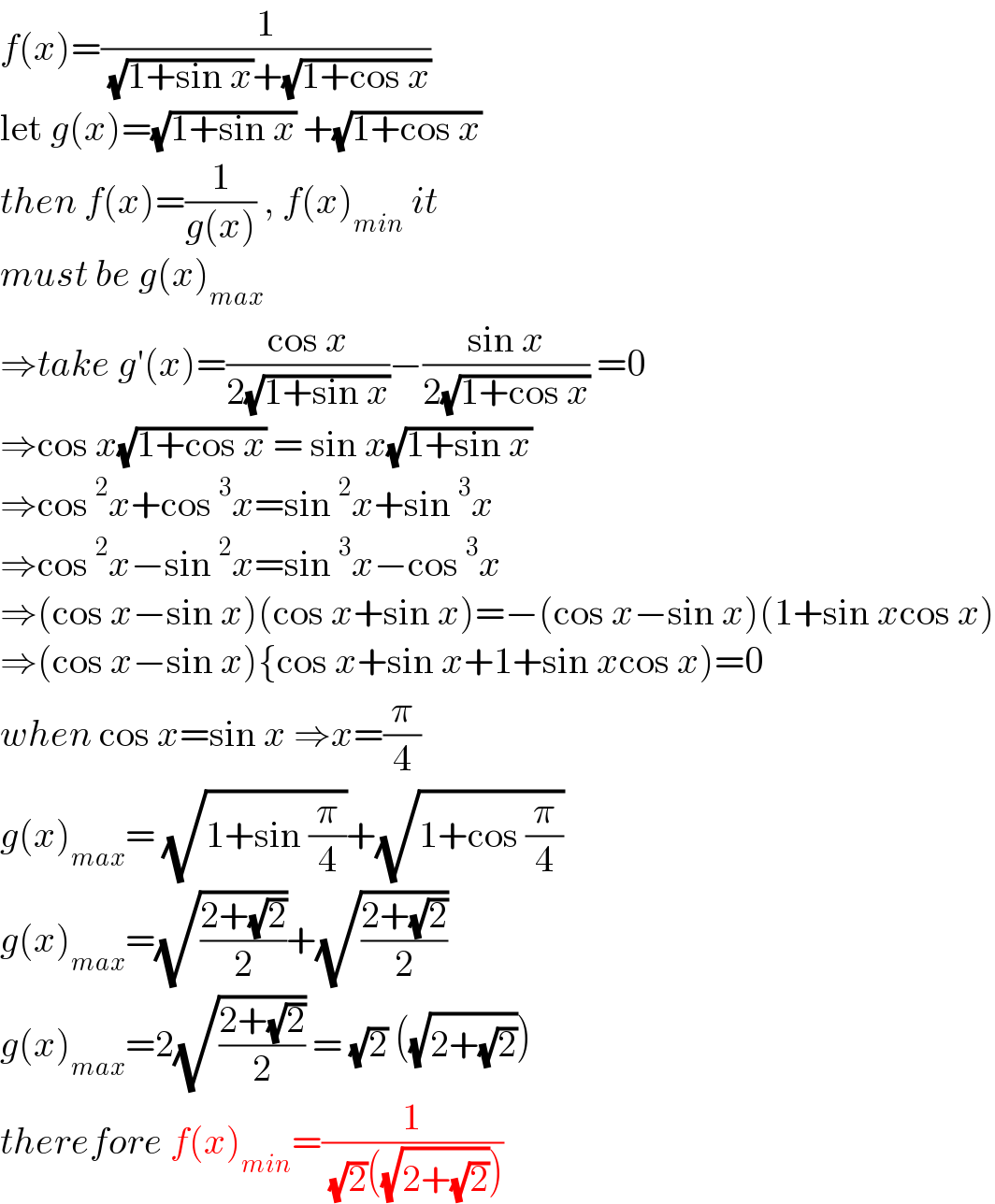Question Number 149667 by mnjuly1970 last updated on 06/Aug/21

$$\: \\ $$$${f}\:\left({x}\:\right)=\:\frac{\mathrm{1}}{\:\sqrt{\:\mathrm{1}\:+\:{sin}\:\left({x}\:\right)}\:+\sqrt{\:\mathrm{1}\:+\:{cos}\:\left({x}\right)}} \\ $$$$\:\:\:\:\:\:\:\:\:\:\:\:{find}: \\ $$$$\:\:\:\:\:\:\:\:\:\:\:\:\:\:\:\:\:\:\:\:\:\:\:\:\:\:\mathrm{Min}\left(\:{f}\:\left({x}\right)\right)\:=? \\ $$$$ \\ $$
Answered by iloveisrael last updated on 07/Aug/21

$$\mathrm{f}\left(\mathrm{x}\right)=\frac{\mathrm{1}}{\mid\mathrm{cos}\:\frac{\mathrm{1}}{\mathrm{2}}\mathrm{x}+\mathrm{sin}\:\frac{\mathrm{1}}{\mathrm{2}}\mathrm{x}\mid+\sqrt{\mathrm{2}}\:\mid\mathrm{cos}\:\frac{\mathrm{1}}{\mathrm{2}}\mathrm{x}\mid} \\ $$$$\mathrm{f}\left(\mathrm{x}\right)=\frac{\mathrm{1}}{\:\sqrt{\mathrm{2}}\:\mid\mathrm{sin}\:\left(\frac{\mathrm{1}}{\mathrm{2}}\mathrm{x}+\frac{\pi}{\mathrm{4}}\right)\mid+\sqrt{\mathrm{2}}\:\mid\mathrm{cos}\:\frac{\mathrm{1}}{\mathrm{2}}\mathrm{x}\mid} \\ $$$$\mathrm{when}\:\mathrm{cos}\:\frac{\mathrm{1}}{\mathrm{2}}\mathrm{x}\:=\mathrm{1} \\ $$$$\mathrm{or}\:\frac{\mathrm{1}}{\mathrm{2}}\mathrm{x}=\:\mathrm{0} \\ $$$$\mathrm{f}_{\mathrm{1}} =\:\frac{\mathrm{1}}{\:\sqrt{\mathrm{2}}\:\mathrm{sin}\:\left(\frac{\pi}{\mathrm{4}}\right)+\sqrt{\mathrm{2}}}\:=\:\frac{\mathrm{1}}{\:\sqrt{\mathrm{2}}\:+\mathrm{1}}=\sqrt{\mathrm{2}}−\mathrm{1} \\ $$$$\mathrm{when}\:\mathrm{sin}\:\left(\frac{\mathrm{1}}{\mathrm{2}}\mathrm{x}+\frac{\pi}{\mathrm{4}}\right)=\mathrm{1} \\ $$$$\mathrm{or}\:\frac{\mathrm{1}}{\mathrm{2}}\mathrm{x}=\frac{\pi}{\mathrm{4}} \\ $$$$\mathrm{f}_{\mathrm{2}} =\:\frac{\mathrm{1}}{\:\sqrt{\mathrm{2}}\:+\sqrt{\mathrm{2}}\left(\frac{\mathrm{1}}{\:\sqrt{\mathrm{2}}}\right)}=\frac{\mathrm{1}}{\:\sqrt{\mathrm{2}}+\mathrm{1}}=\sqrt{\mathrm{2}}−\mathrm{1} \\ $$$$\mathrm{f}\left(\mathrm{x}\right)=\:\sqrt{\mathrm{2}}\:−\mathrm{1} \\ $$$$\mathrm{when}\:\frac{\mathrm{1}}{\mathrm{2}}\mathrm{x}=\frac{\pi}{\mathrm{8}}\:\mathrm{we}\:\mathrm{get} \\ $$$$\mathrm{f}_{\mathrm{3}} =\frac{\mathrm{1}}{\:\sqrt{\mathrm{2}}\:\left\{\mid\mathrm{sin}\:\frac{\mathrm{3}\pi}{\mathrm{8}}\mid+\mid\mathrm{cos}\:\frac{\pi}{\mathrm{8}}\mid\right\}} \\ $$$$\mathrm{sin}\:\frac{\mathrm{3}\pi}{\mathrm{8}}=\sqrt{\frac{\mathrm{1}−\mathrm{cos}\:\frac{\mathrm{3}\pi}{\mathrm{4}}}{\mathrm{2}}}=\sqrt{\frac{\mathrm{1}+\frac{\sqrt{\mathrm{2}}}{\mathrm{2}}}{\mathrm{2}}}=\sqrt{\frac{\mathrm{2}+\sqrt{\mathrm{2}}}{\mathrm{4}}}=\frac{\sqrt{\mathrm{2}+\sqrt{\mathrm{2}}}}{\mathrm{2}} \\ $$$$\mathrm{cos}\:\frac{\pi}{\mathrm{8}}=\sqrt{\frac{\mathrm{1}+\mathrm{cos}\:\frac{\pi}{\mathrm{4}}}{\mathrm{2}}}=\sqrt{\frac{\mathrm{2}+\sqrt{\mathrm{2}}}{\mathrm{4}}}=\frac{\sqrt{\mathrm{2}+\sqrt{\mathrm{2}}}}{\mathrm{2}} \\ $$$$\mathrm{f}\left(\mathrm{x}\right)_{\mathrm{min}} =\mathrm{f}_{\mathrm{3}} =\frac{\mathrm{1}}{\:\sqrt{\mathrm{2}}\:\left\{\frac{\sqrt{\mathrm{2}+\sqrt{\mathrm{2}}}}{\mathrm{2}}+\frac{\sqrt{\mathrm{2}+\sqrt{\mathrm{2}}}}{\mathrm{2}}\right\}} \\ $$$$\:=\:\frac{\mathrm{1}}{\:\sqrt{\mathrm{2}}\:\left(\sqrt{\mathrm{2}+\sqrt{\mathrm{2}}}\right)} \\ $$
Commented by mnjuly1970 last updated on 06/Aug/21

$${thx}\:{master}… \\ $$
Commented by mnjuly1970 last updated on 06/Aug/21

$$\:\:\:{min}?\:\:\frac{\mathrm{1}}{\:\sqrt{\mathrm{2}}\:\left(\sqrt{\mathrm{2}+\sqrt{\mathrm{2}}\:}\:\right)} \\ $$
Answered by EDWIN88 last updated on 07/Aug/21

$${f}\left({x}\right)=\frac{\mathrm{1}}{\:\sqrt{\mathrm{1}+\mathrm{sin}\:{x}}+\sqrt{\mathrm{1}+\mathrm{cos}\:{x}}}\: \\ $$$$\mathrm{let}\:{g}\left({x}\right)=\sqrt{\mathrm{1}+\mathrm{sin}\:{x}}\:+\sqrt{\mathrm{1}+\mathrm{cos}\:{x}} \\ $$$${then}\:{f}\left({x}\right)=\frac{\mathrm{1}}{{g}\left({x}\right)}\:,\:{f}\left({x}\right)_{{min}} \:{it} \\ $$$${must}\:{be}\:{g}\left({x}\right)_{{max}} \\ $$$$\Rightarrow{take}\:{g}'\left({x}\right)=\frac{\mathrm{cos}\:{x}}{\mathrm{2}\sqrt{\mathrm{1}+\mathrm{sin}\:{x}}}−\frac{\mathrm{sin}\:{x}}{\mathrm{2}\sqrt{\mathrm{1}+\mathrm{cos}\:{x}}}\:=\mathrm{0} \\ $$$$\Rightarrow\mathrm{cos}\:{x}\sqrt{\mathrm{1}+\mathrm{cos}\:{x}}\:=\:\mathrm{sin}\:{x}\sqrt{\mathrm{1}+\mathrm{sin}\:{x}} \\ $$$$\Rightarrow\mathrm{cos}\:^{\mathrm{2}} {x}+\mathrm{cos}\:^{\mathrm{3}} {x}=\mathrm{sin}\:^{\mathrm{2}} {x}+\mathrm{sin}\:^{\mathrm{3}} {x} \\ $$$$\Rightarrow\mathrm{cos}\:^{\mathrm{2}} {x}−\mathrm{sin}\:^{\mathrm{2}} {x}=\mathrm{sin}\:^{\mathrm{3}} {x}−\mathrm{cos}\:^{\mathrm{3}} {x} \\ $$$$\Rightarrow\left(\mathrm{cos}\:{x}−\mathrm{sin}\:{x}\right)\left(\mathrm{cos}\:{x}+\mathrm{sin}\:{x}\right)=−\left(\mathrm{cos}\:{x}−\mathrm{sin}\:{x}\right)\left(\mathrm{1}+\mathrm{sin}\:{x}\mathrm{cos}\:{x}\right) \\ $$$$\Rightarrow\left(\mathrm{cos}\:{x}−\mathrm{sin}\:{x}\right)\left\{\mathrm{cos}\:{x}+\mathrm{sin}\:{x}+\mathrm{1}+\mathrm{sin}\:{x}\mathrm{cos}\:{x}\right)=\mathrm{0} \\ $$$${when}\:\mathrm{cos}\:{x}=\mathrm{sin}\:{x}\:\Rightarrow{x}=\frac{\pi}{\mathrm{4}} \\ $$$${g}\left({x}\right)_{{max}} =\:\sqrt{\mathrm{1}+\mathrm{sin}\:\frac{\pi}{\mathrm{4}}}+\sqrt{\mathrm{1}+\mathrm{cos}\:\frac{\pi}{\mathrm{4}}} \\ $$$${g}\left({x}\right)_{{max}} =\sqrt{\frac{\mathrm{2}+\sqrt{\mathrm{2}}}{\mathrm{2}}}+\sqrt{\frac{\mathrm{2}+\sqrt{\mathrm{2}}}{\mathrm{2}}} \\ $$$${g}\left({x}\right)_{{max}} =\mathrm{2}\sqrt{\frac{\mathrm{2}+\sqrt{\mathrm{2}}}{\mathrm{2}}}\:=\:\sqrt{\mathrm{2}}\:\left(\sqrt{\mathrm{2}+\sqrt{\mathrm{2}}}\right) \\ $$$${therefore}\:{f}\left({x}\right)_{{min}} =\frac{\mathrm{1}}{\:\sqrt{\mathrm{2}}\left(\sqrt{\mathrm{2}+\sqrt{\mathrm{2}}}\right)} \\ $$
